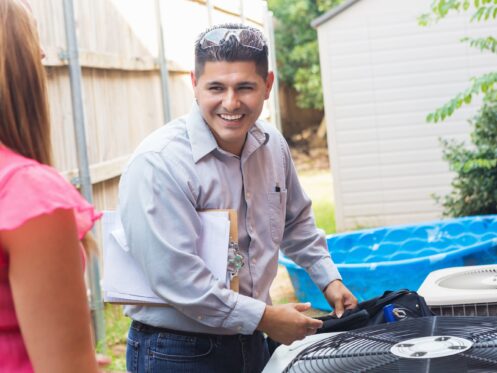One of the most important systems in your household is your HVAC system. It’s necessary to keep your home warm and safe during the wintertime and cool and comfortable during the summer months. If you’re in the market for a new HVAC system, you have the option of going with a heat pump or a traditional HVAC setup.
Below, we’ll address how each of these systems work so that you can make a better-informed decision about which one is right for your home.
Heat Pumps
A heat pump is an all-in-one solution that provides both heating and cooling for your home. These systems are composed of two different units, an indoor air handler unit and an outdoor condenser unit. Unlike other types of heating systems, heat pumps do not actually burn fuel to create heat. Rather, they transport heat from one location to the next.
For example, during the summertime, your heat pump will extract heat from inside your home and transport it outdoors. However, in the wintertime, your heat pump will extract heat from the air outside and bring it into your home to warm it up. Because these systems don’t burn fuel, they’re very energy efficient. Their high efficiency allows for lower utility bills than more traditional HVAC options.
Traditional Systems
Traditional HVAC systems have two different units, one responsible for heating your home and the other for cooling it. The most traditional form of HVAC system includes a furnace and a central air conditioning unit. Furnaces can run on natural gas, propane, oil, or be powered by electricity. Central air conditioning systems utilize electricity and work very similarly to a heat pump during the summer months.
Operating Efficiency
One of the key things you’ll want to look at when purchasing a new HVAC system for your home is its operating efficiency. The higher the efficiency, the less it’s going to cost you to run. Most furnaces have an operating efficiency anywhere between 80% and 100%. Standard models operate at around 80% efficiency, and high-efficiency models can operate at around 95%.
Electric furnaces have the highest operating efficiency of 100%. Heat pumps have an operating efficiency of around 300 to 400%. It’s very clear to see that their efficiency well outperforms any furnace that you could purchase. When it comes to air conditioning, both heat pumps and central air conditioners have very similar operating efficiencies.
It’s important to note that a select type of heat pump is the ductless mini-split, which uses multiple indoor air handler units instead of traditional ductwork to deliver cold air throughout your home. Mini-splits are more energy efficient for cooling your home than traditional central AC units because they don’t lose any of their treated air through gaps or leaks in the ductwork.
Upfront Cost
Cost is a very important factor you always need to consider when purchasing any new system for your home. Heat pumps are typically the most expensive to purchase because they are a two-in-one unit. When combining the cost of a central air conditioner and a furnace, their price is typically a little lower or equal to that of a heat pump for a similar-sized home.
If you already have a well-functioning air conditioning system and just need to upgrade your heater, it’s obviously cheaper to simply purchase a furnace than upgrade to a heat pump. However, if your home is due for both a heater and an air conditioning system, a heat pump can be an easier solution.
Currently, homeowners can recoup some of the upfront cost of purchasing a new HVAC system for their home under the Inflation Reduction Act of 2022. In general, most heat pumps you purchase will qualify for this tax credit because of their high operating efficiency. It’s important to double-check the efficiency rating for any central air conditioner or furnace that you’re thinking about purchasing to ensure that it qualifies for the minimum standards of this tax credit. You can find the qualifications on ENERGY STAR’s website.
Ease of Installation
Another factor you may need to take into consideration is the ease of installation for your new HVAC system. Traditional HVAC systems require ductwork to deliver hot and cold air throughout the various rooms of your household. There are traditional boiler systems that utilize radiators or baseboard systems to deliver heat throughout your home.
If you have one of these systems, it can be challenging to add a traditional central air conditioner after the fact. Because central air conditioners require ductwork to operate, you would have to have air ducts installed in your home. This can be a very costly and invasive process after your home is already constructed because it requires ripping some of your flooring and walls out to accommodate the placement of your new air ducts.
This is where a ductless mini-split heat pump may be the ideal solution. These systems don’t utilize ductwork, so there’s no need to do any extensive installation process. All they require is a small hole drilled in the exterior wall wherever you have your indoor air handler units mounted. This is very non-invasive and a great retrofitting option for existing homes looking to add whole-home air conditioning systems.
Maintenance Requirements
All HVAC systems need to receive routine maintenance to stay in good working condition. Heat pumps require two professional visits a year, one in the spring and one in the fall. As a homeowner, you’ll need to ensure that your HVAC filter gets routinely changed and the outdoor condenser unit remains free from any debris, like leaves that may blow up against it.
A central air conditioner requires an annual maintenance appointment in the spring to prepare it for the upcoming summer season. A furnace requires full maintenance to get it ready for the winter season. A traditional HVAC setup will require routine filter changes, just like a heat pump. If your furnace burns heating oil or propane, you’ll need to ensure that you’re getting a frequent delivery of fuel throughout the winter so your system can constantly run.
A Note on Cold Climates
Traditionally, heat pumps weren’t well-equipped to operate efficiently during the wintertime in colder climates like Denver. In fact, most homeowners had a dual-use system where they used their heat pump throughout the summer and milder winter days and switched over to using their gas furnace when temperatures dipped below freezing. This ensured a nice warm environment and efficient heating costs.
Nowadays, there are heat pumps specifically designed for colder climates like Denver. These heat pumps operate efficiently down to a temperature of negative 20 degrees Fahrenheit or more. It’s important when purchasing a heat pump for your home that you ensure you get one rated for colder climates that will still operate efficiently during those colder wintertime temperatures.
Exceptional HVAC Installation Service
Horizon Services offers exceptional heating services for the Denver, CO community. We can also help with all your HVAC repair, replacement, and maintenance needs. Just phone our office today to book your next service appointment with one of our helpful technicians.


